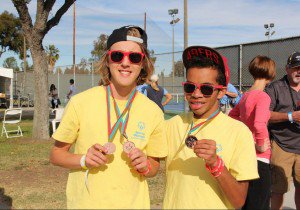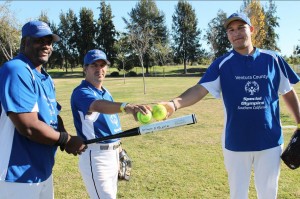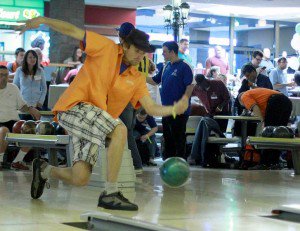By Erica Rascón on August 13, 2014 in Giving People
Competition can be empowering. It doesn’t matter whether the compet ition takes place on a field, court or office. Knowing that you will go head-to-head with a worthy competitor encourages you to set goals, hone your skills, and believe that you are capable of emerging from the competition as a victor. You alone can forge the path to victory.
ition takes place on a field, court or office. Knowing that you will go head-to-head with a worthy competitor encourages you to set goals, hone your skills, and believe that you are capable of emerging from the competition as a victor. You alone can forge the path to victory.
Michelle Duke, Manager of Special Events and Volunteers at Special Olympics Santa Barbara, has seen the empowerment of competition at work in the athletes that she serves. From weekly practices to grueling four hour tournaments, Special Olympics athletes first challenge themselves before challenging their opponents. Their personal victories give them the confidence needed to tackle larger challenges in life.
“We have an athlete who was incredibly shy. He really didn’t have any friends,” says Duke. “He got into our program and soon became a leader to other athletes. He took part in Global Youth Activation Summit where he was able to travel to Korea for the World Games. He served as an ambassador for Special Olympics. He really never would have been able to do it without the confidence that he gained with Special Olympics.” The experience empowered him with the skills needed to step out in other areas and live his life to the fullest. “Participation in the programs changes athletes’ outlook, social skills, and impacts their lives,” Duke says.
Through Special Olympics, athletes also gain a support system that provides encouragement and camaraderie. Without such programing, many adults living with developmental  disabilities can lead solitary lives; it can be challenging to relate to others. “Being in Special Olympics helps [athletes] connect with people of their same background, people who understand them,” says Duke. The social aspect of the games strengthens self-esteem, builds character, and provides athletes with an outlet that they may not have otherwise. Each component is a tool that they can use throughout their lives on and off of the court.
disabilities can lead solitary lives; it can be challenging to relate to others. “Being in Special Olympics helps [athletes] connect with people of their same background, people who understand them,” says Duke. The social aspect of the games strengthens self-esteem, builds character, and provides athletes with an outlet that they may not have otherwise. Each component is a tool that they can use throughout their lives on and off of the court.
That’s why Special Olympics places emphasis on its school games, small competitions for students in special education classes that take place during the school day. “Through our headquarters, we’re really trying to engage younger athletes and get them into our programs earlier to show them the benefits that Special Olympics provides at an earlier age. That way, they can develop that determination, friendships, social skills, and sports skills earlier and reap the lifetime benefits later on.”
The school games began with track and field. A contribution from Yardi recently spearheaded the first soccer games in fall 2013. The event was held at Girsh Park and attended by 160 special education students. The program was a huge success with an even greater expected turnout for this fall.
“These events are so important in our community and this population,” begins Duke. “They’re much underserved. A lot of our athletes are low income and live in group housing and of course we offer these programs at no cost to our athletes. They don’t pay to participate or buy their equipment. Funding and volunteer hours come from our local community so it’s incredibly important for our community to invest in these athletes and in their futures.”
are low income and live in group housing and of course we offer these programs at no cost to our athletes. They don’t pay to participate or buy their equipment. Funding and volunteer hours come from our local community so it’s incredibly important for our community to invest in these athletes and in their futures.”
There are various ways that you can show your support. Adults with medical experience can volunteer during local tournaments or as medical technicians through the Healthy Athletes programs. Others can volunteer to assist players, help facilitate games, or simply cheer teams to victory. Monetary donations go towards equipment, transportation, hosting Special Olympic events, and program development throughout the Santa Barbara area. Each effort ensures the empowerment and edification of Special Olympics athletes throughout the region.


